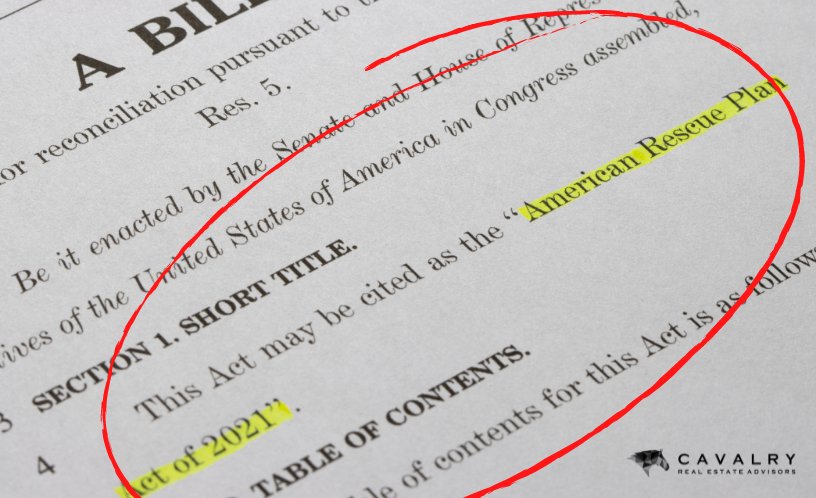How ARPA Funds May Change Your Tax Outlook

During the Great Recession (2007-2009), state and local budgets were hammered. Tax revenues took a major hit as most residential assessment bases declined by double digits, with some erosion as high as 50%. Residential property tax revenue makes up between 30% to70% of a local jurisdiction’s entire property tax base on average. Property tax revenue as a whole (commercial + residential), makes up about 50% of the total tax revenue a local jurisdiction collects.
When residential assessments took a hit during the Great Recession, that adversely impacted local budgets disproportionately given their reliance on residential property tax revenue. As a result, property tax rates went up to offset the erosion in the assessment base. Many jurisdictions cut budgets in addition to raising property tax rates, but the systemic problems remained. Additionally, there was very little relief offered to state and local jurisdictions, as most relief and bailouts were targeted towards corporations and businesses.
The COVID pandemic and its subsequent impact on the economy has been markedly different. The residential real estate market has remained strong and values have consistently increased – and residential real estate assessments have increased in turn. In addition, commercial properties such as apartments, industrial, and data centers have generally continued to increase in value, with a few exceptions. Overall, property tax coffers have remained full and growing. And while values for certain commercial assets such as retail, hospitality, and office buildings have been bludgeoned during the pandemic, overall the assessment base in local jurisdictions has remained strong.
In stark contrast to the Great Recession, this time the federal government has approved a massive relief package (ARPA) targeted specifically to state and local governments to help backfill lost revenue associated with other types of tax revenue loss such as gross receipts, sales, meals tax and transient occupancy taxes. And while some jurisdictions that have larger commercial property tax assessment bases that are overly reliant on office and retail need that money as well, the vast majority of suburban or diversified jurisdictions did not take huge hits to their real estate assessment base due to the ever-growing residential assessment base.
So, what will come of this Federal money, you might ask? While the federal government has put specific requirements on its use, the money is allowing governments to plug budget gaps which will in an indirect way allow them to reduce the property tax rate.
As a matter of fact, in Northern Virginia, more than half of the major taxing jurisdictions are actually proposing to lower their property tax rates by a few pennies if not more. While this may not sound significant, in the grand scheme of things, considering the massive economic downturn that has been experienced nationally, seeing taxing jurisdictions lower their property tax rate is notable to say the least.
However, don’t feel too rosy about the property tax look. Given the increase in assessed values, most property owners will still see a higher tax bill. Unless you are one of the commercial assets that has taken a more pronounced hit during the COVID pandemic, your assessment is still most likely going up and the lowered tax rate isn’t enough to offset the increase. The good news is that you can always appeal an assessed value and that’s where we can help.
Bottom Line: Don’t get complacent with talk of lower property tax rates, because you will still want to pursue an assessment appeal to achieve ACTUAL savings year over year.
BACK TO ARTICLES